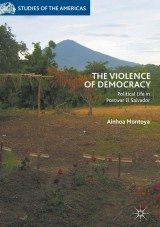Details

The Violence of Democracy
Political Life in Postwar El SalvadorStudies of the Americas
|
24,60 € |
|
| Verlag: | Palgrave Macmillan |
| Format: | |
| Veröffentl.: | 12.05.2018 |
| ISBN/EAN: | 9783319763309 |
| Sprache: | englisch |
Dieses eBook enthält ein Wasserzeichen.
Beschreibungen
This book offers novel insights about the ability of a democracy to accommodate violence. In El Salvador, the end of war has brought about a violent peace, one in which various forms of violence have become incorporated into Salvadorans’ imaginaries and enactments of democracy. Based on ethnographic research, The Violence of Democracy argues that war legacies and the country’s neoliberalization have enabled an intricate entanglement of violence and political life in postwar El Salvador. This volume explores various manifestations of this entanglement: the clandestine connections between violent entrepreneurs and political actors; the blurring of the licit and illicit through the consolidation of economies of violence; and the reenactment of latent wartime conflicts and political cleavages during postwar electoral seasons. The author also discusses the potential for grassroots memory work and a political party shift to foster hopeful visions of the future and, ultimately, to transform the country’s violent democracy.
1. Introduction .- 2. The Fallacy of the Telos of Transition .- 3. The Postwar Gray Zone of Politics .- 4. Neoliberalization and the Violence Within .- 5. War Reenactment through Elections .- 6. Memory Work in the Aftermath of War .- 7. The 2009 Shift .- 8. Conclusion.- 9. Epilogue.
<b>Ainhoa Montoya</b> is Lecturer in Latin American Studies and ESRC Future Research Leaders Fellow at the School of Advanced Study, University of London, UK.
<div><div>This book offers novel insights about the ability of a democracy to accommodate violence. In El Salvador, the end of war has brought about a violent peace, one in which various forms of violence have become incorporated into Salvadorans’ imaginaries and enactments of democracy. Based on ethnographic research, The Violence of Democracy argues that war legacies and the country’s neoliberalization have enabled an intricate entanglement of violence and political life in postwar El Salvador. This volume explores various manifestations of this entanglement: the clandestine connections between violent entrepreneurs and political actors; the blurring of the licit and illicit through the consolidation of economies of violence; and the reenactment of latent wartime conflicts and political cleavages during postwar electoral seasons. The author also discusses the potential for grassroots memory work and a political party shift to foster hopeful visions of the future and, ultimately, to transform the country’s violent democracy.</div><div><br></div><div><b>Ainhoa Montoya </b>is Lecturer in Latin American Studies and ESRC Future Research Leaders Fellow at the School of Advanced Study, University of London, UK.</div></div><div><br></div>
Demonstrates anthropology’s ability to contribute to the study of democracy-making and explores how the notion of democracy can be imbued with diverse meanings Ethnographically examines citizens’ practices and political subjectivities in the context of a post-war, liberal market democracy Sheds light on the complexity of endemic violence in El Salvador and the relationship of this violence to the country’s gray domains of politics
<div></div><div><div>Demonstrates anthropology’s ability to contribute to the study of democracy-making and explores how the notion of democracy can be imbued with diverse meanings</div><div><br></div><div>Ethnographically examines citizens’ practices and political subjectivities in the context of a post-war, liberal market democracy</div><div><br></div><div>Sheds light on the complexity of endemic violence in El Salvador and the relationship of this violence to the country’s gray domains of politics</div></div><div><br></div>
<p>“The relationship between violence and democracy has long troubled scholars from a range of disciplines. Democracy means the end of political violence, doesn’t it? Perhaps not. Ainhoa Montoya provides a rich ethnographic look at the nature of political violence in postwar El Salvador, violence that persists and even intensifies within and alongside the development of that country’s political democracy. Beautifully written and deeply troubling, Montoya’s ethnographic account explores the multiple meanings of both violence and democracy, revealing them to be intimately entangled in the lived experience of contemporary Salvadorans. The book makes a strong case for the importance of ethnography to the study of democratization, citizenship, and peacebuilding; it demonstrates the many ways in which violence is an inescapable part of political democracy, in El Salvador and elsewhere around the world.” (Daniel M. Goldstein, Professor of Anthropology, Rutgers University, USA)</p>
<p>“AinhoaMontoya offers a lucid analysis of a puzzling paradox: how does the site of global hope for peace transform into one of the most dangerous spots in the world? Her rigorous ethnography of both political ritual and everyday life is unmatched in post-conflict studies. This book should be required reading for those who want to understand how violence became embedded in El Salvador’s democracy, indeed in many post-Cold War, liberal market democracies.” (Ellen Moodie, Associate Professor of Anthropology, University of Illinois at Urbana-Champaign, USA)</p><br>
<p>“AinhoaMontoya offers a lucid analysis of a puzzling paradox: how does the site of global hope for peace transform into one of the most dangerous spots in the world? Her rigorous ethnography of both political ritual and everyday life is unmatched in post-conflict studies. This book should be required reading for those who want to understand how violence became embedded in El Salvador’s democracy, indeed in many post-Cold War, liberal market democracies.” (Ellen Moodie, Associate Professor of Anthropology, University of Illinois at Urbana-Champaign, USA)</p><br>
Diese Produkte könnten Sie auch interessieren:

Grassroots Developments and Governmental Interventions in Nigeria's Fourth Republic

von: Emmanuel N. Vitus

36,99 €
















